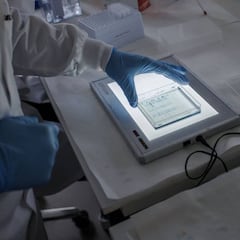Coronavirus: can Covid-19 be spread through water?
Although it has been proven that SARS is transmittable through untreated water, there is currently no evidence that Covid-19 can be considered a waterborne disease.

While it is acknowledged that the novel coronavirus can be spread from person to person via airborne particles, a less clarified study area of the current Covid-19 pandemic is whether or not it can also be considered a waterborne disease. Most waterborne diseases are transmitted through bacteria, not viruses, although there is evidence that SARS can be transmitted through improperly treated water.
Does that mean that Covid-19, the origins of which can be traced back to the SARS outbreak of 2002-04, be transmitted through water? As yet, there is no evidence to suggest so.
Drinking water, pools and spas safe says CDC

The US Centers for Disease Control and Prevention states: "The virus that causes COVID-19 has not been detected in drinking water. Conventional water treatment methods that use filtration and disinfection, such as those in most municipal drinking water systems, should remove or inactivate the virus that causes Covid-19."
The CDC also notes that the chance of Covid-19 manifesting itself in swimming pools, spas, jacuzzis and similar places is similarly unlikely due to the treatment of the water with cholrine and bromide.
The virus that causes COVID-19 (SARS-CoV-2) has been detected in untreated wastewater but the CDC states there is no evidence that the novel coronavirus can be contracted by coming into contact with it. The possibility of becoming infected via the faeces of a Covid-19 carrier is also remote - there have been no confirmed reports of this occurring. Based on what was learned from the SARS and MERS (Middle East respiratory syndrome) outbreaks, scientists believe that there is a very low risk of person-to-person infection from faeces as Covid-19 does not remain active for long after being expelled from the human body.
In fact, wastewater could prove to be a vital resource if future outbreaks occur. A one-month study in Paris was able to gauge the rise and fall in the number of cases in the French capital during lockdown. Sébastien Wurtzer, a virologist at Eau de Paris, the city’s public water utility, explained that the higher the concentration of Covid-19 in wastewater, the higher the number of infected people: "This visibility is also going to help us predict a second wave of outbreaks,” Wurtzer told sciencemag.org.
Coronavirus symptoms
CDC confirms six new coronavirus symptoms that are showing up in patients over and over:
— The Washington Post (@washingtonpost) April 27, 2020
Chills
Repeated shaking with chills
Muscle pain
Headache
Sore throat
New loss of taste or smellhttps://t.co/W3VKHho61D
The World Health Organization lists coronavirus symptoms as fever, dry cough, and tiredness. Some patients may have aches and pains, nasal congestion, sore throat or diarrhea and the main form of infection as inhaling droplets from an infected person.
Related stories
It is also possible to contract Covid-19 by coming into contact with surfaces on which these droplets have been spread. The WHO notes that the droplets that spread Covid-19 are heavy and sink quickly, rather than remaining airbourne for long periods.
According to the WHO, the coronavirus can survive for up to 72 hours on plastic and stainless steel, less than 4 hours on copper and less than 24 hours on cardboard.

